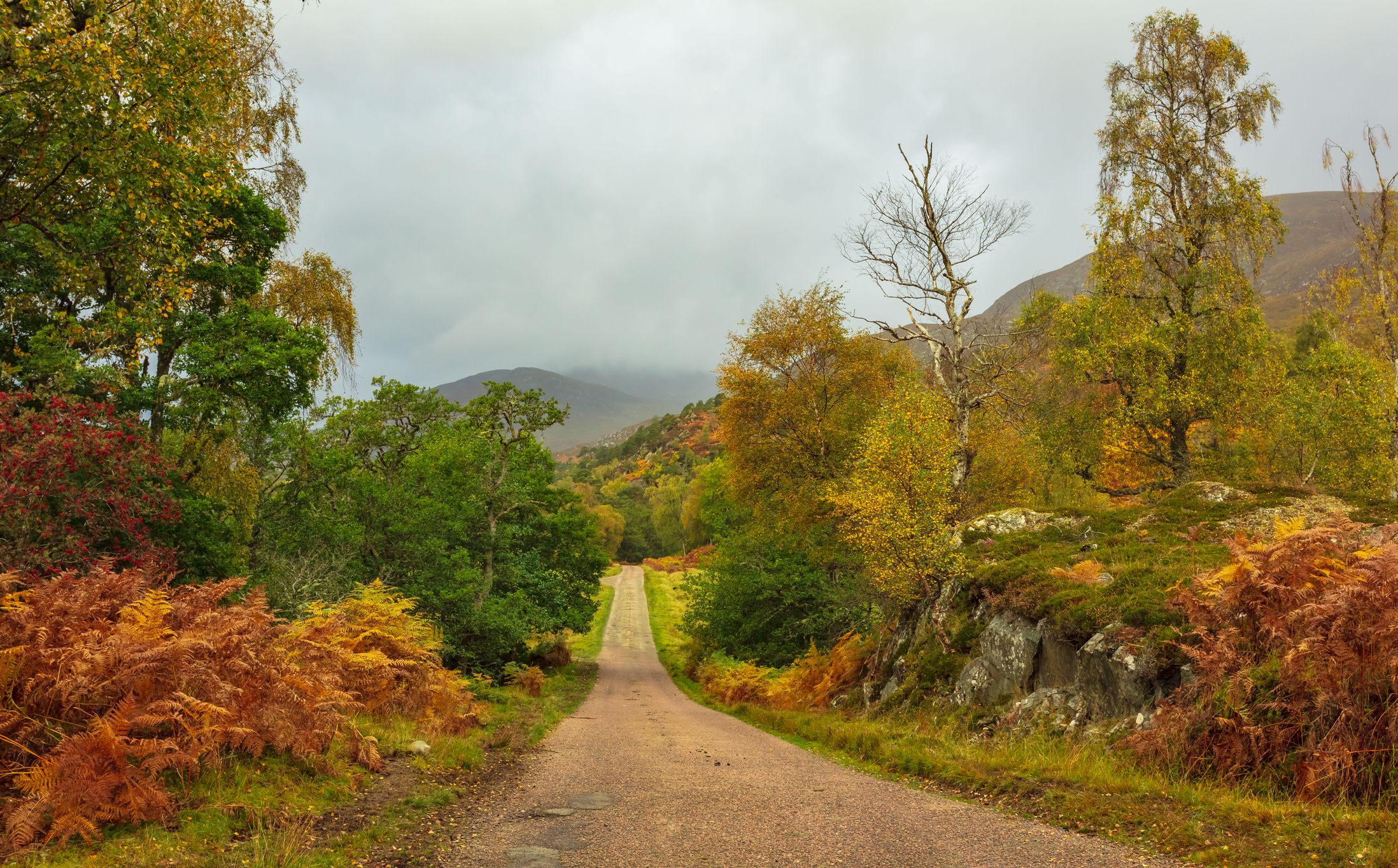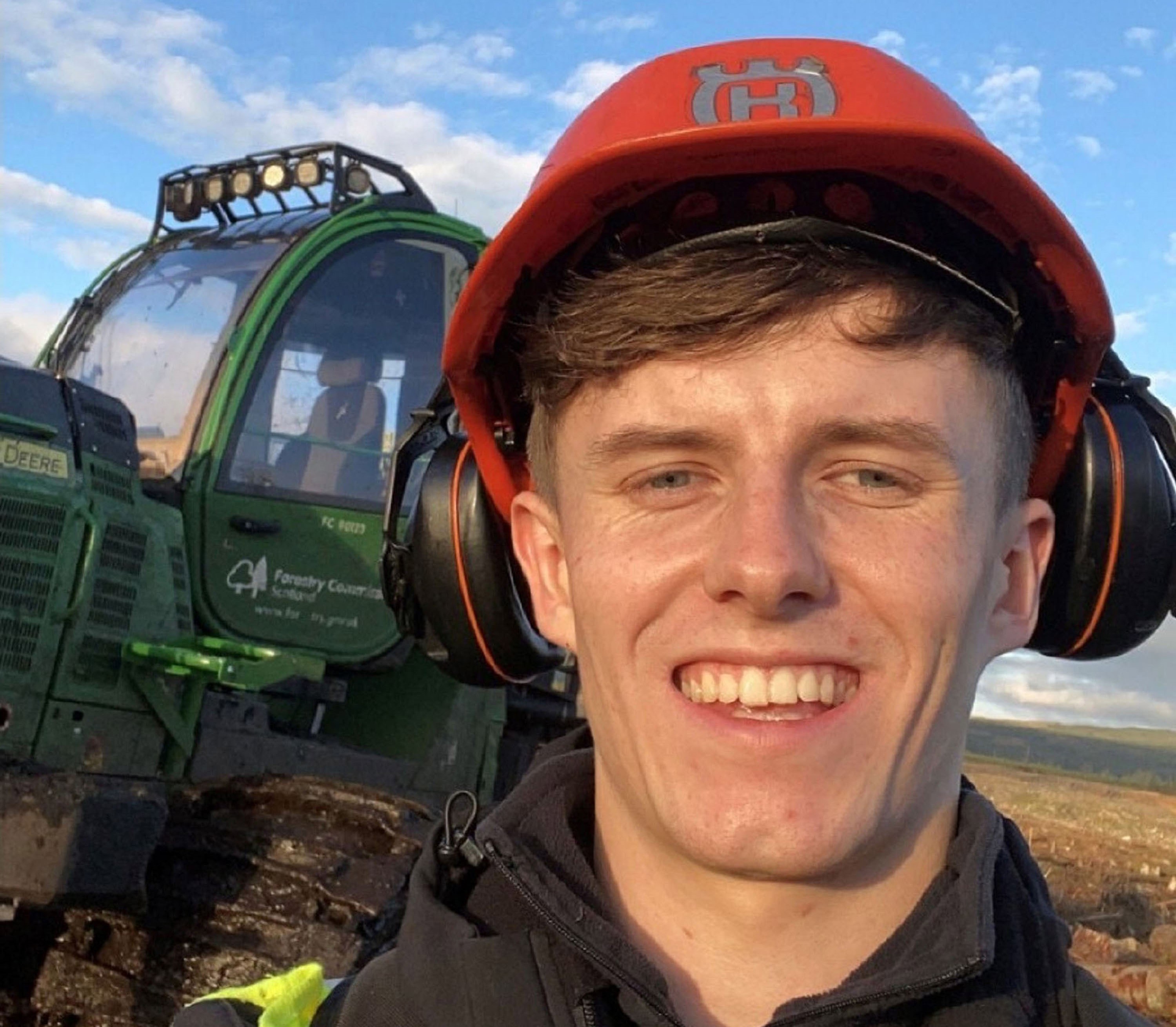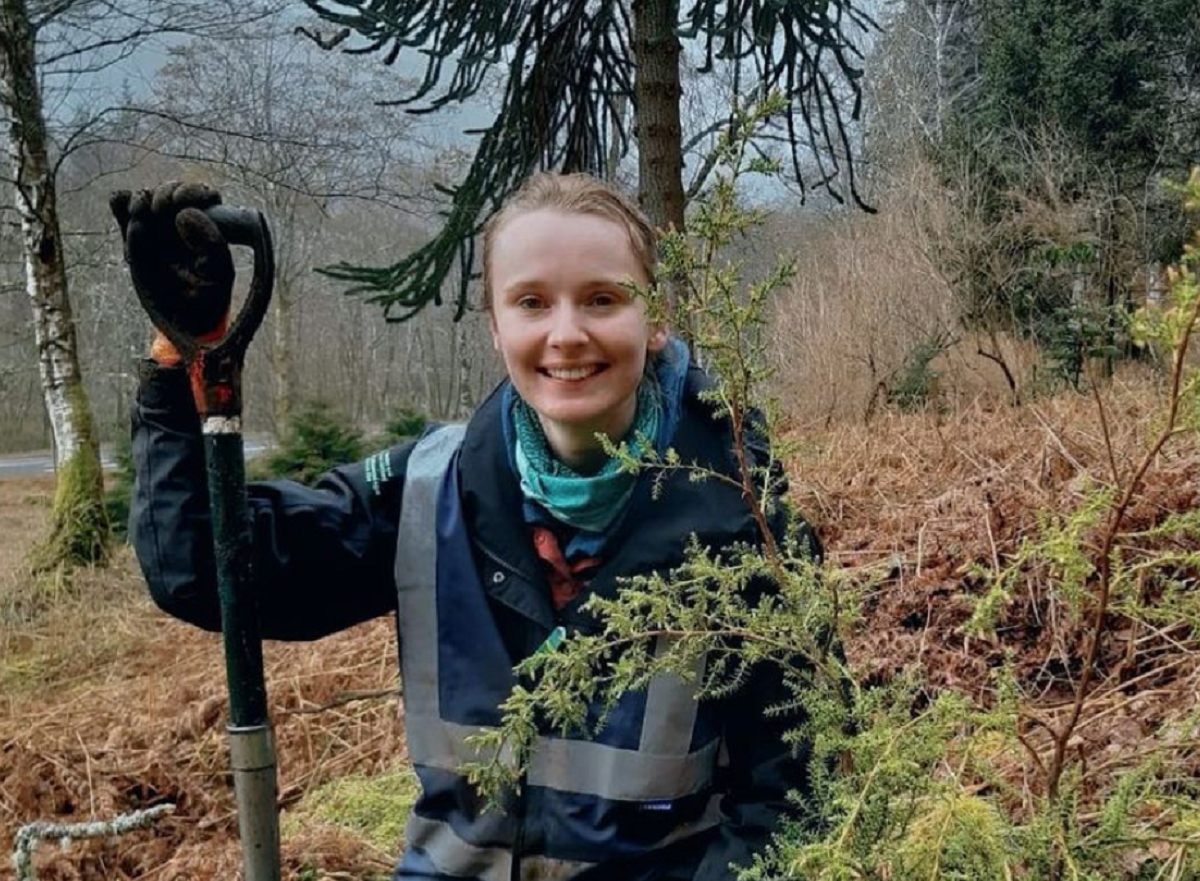

At the age when many of his fellow pupils were preparing for college or university, Euan Sneddon from Newton Stewart was already thinking about the world of work. He joined what was then Forestry Commission Scotland to do an apprenticeship in trees and timber, with support from SRUC Barony.
Euan said: “Ever since I can remember, I’ve always loved to use the forest recreationally through mountain biking, hill walking, running and fishing. When I saw the apprenticeship advertised I knew I couldn’t let it pass me by. I knew this was an opportunity to get out into the forest I loved as a child and give something back so more people like me could enjoy it in the same way.
“To end up working for the organisation that looks after Scotland’s national forests at 17 was a great experience and gave me the confidence to push on. The apprenticeship is a great way to learn while you work, and helps you make sense of what you’re doing. For example, you look at best practice in different areas of trees and timber, but being on site and doing the work brings it to life.”
Clearly Euan was doing something right because he was soon nominated for Lantra Scotland’s ALBAS and went on to win the trees and timber category at the final back in March, which had a big impact on the young forester.
He said: “It was great to go along to the Dunblane Hydro as a finalist, but actually winning an ALBAS award on the night was a brilliant experience. It’s given me more recognition within the industry and I’m proud to have it on my CV as well.”
Since winning the ALBAS and completing his apprenticeship, Euan has landed a role as an Assistant Woodland Officer in what is now Forestry and Land Scotland, working with landowners and farmers applying for felling permissions or grants for new woodland creation projects. This has given him a deeper insight into the relationship between forestry operators and landowners.
He said: “I think these days farmers are looking to diversify more, and forestry is a popular choice. My job is a mixture of reading through applications and contacting agents and landowners, as well as getting outside for compliance checks and meeting people onsite, which breaks the day up nicely. I find it really satisfying when an application has been successful and the landowner gets what they’re looking for.”
Euan is also well aware of the increasing need to tackle climate change.
“When I first got involved in forestry, I didn’t realise how important trees were in lowering carbon. I know now that forestry can provide a decent income for farmers while helping to save the planet.
“The Government publishes annual tree planting targets which we help meet, so it’s really good to know that the work you are doing is having a wider impact. I’ve learnt a lot more about the bigger picture in the last few years.”
As with many industries across the rural sector, forestry has been affected by the recent Covid-19 outbreak, which Euan has experienced first-hand.
He said: “When the lockdown came in, the whole industry was in limbo for a couple of months. Our office closed and there were no site visits, but things seemed to pick up pretty quickly after that. Most of the work we do is outdoors over large areas, so social distancing is much easier. There are restrictions on the number of people who can work in the office, but onsite it’s really just about keeping our distance and making sure equipment is properly sanitised.”
At the age of 19, Euan has plenty of time to decide on his future, but he already has firm plans.
He said: “I think the most important thing for me right now is to keep learning. I’d like to go on and get my HNC and eventually get a promotion to the Woodland Officer role. I’m very keen to stay with Forestry and Land Scotland and work my way up. There’s so much to learn in this industry and I’m enjoying picking up tips and ideas from my colleagues."
I’m currently working on a John Deere forwarder, so I go into the forest after the harvester has cut the trees down, take them out and stack them by the roadside, ready for the lorry drivers to take off site. Normally I can move 100 plus tons a day, but I always make sure I do it as neatly as I can.
Safety’s a big concern for us, so first thing I do each morning is check my machine. At the end of the day, I carry out any maintenance that’s needed, top up the fuel, oil and grease then walk around the vehicle to make sure everything's OK. I’m qualified to drive a harvester as well, but I really prefer using the forwarder.
There are some days when the weather’s a bit wild and that’s when we have to spend more time doing brashing. That’s using branches to provide more support on tracks and haulage routes, which keeps the machine from getting stuck. Damage to the ground is also reduced, which is better for the habitats and landscapes we’re working in.
My company’s given me a lot of support, especially during my apprenticeship, so it’s been easier to learn from any mistakes I’ve made.
The best bit about my job is that you're always doing different things. Sometimes you could be lifting timber, the next day you could be building bridges or clearing out drains to keep water courses clean.
I’m really into machines, so I love having a job that involves driving into the forest and managing woodland. It’s a pretty rewarding career.

Malcolm Whyte tells us how part-time study enabled him to get his dream job as a forestry operations manager with Atholl Estates in Perthshire.
I am 25 and currently live in Banchory, Aberdeenshire, known for its beautiful views of rolling countryside and river walks along the Dee. Since March of 2021, I have worked as a Trees and Timber Apprentice with Forestry and Land Scotland (FLS) at the Durris office. Here, I help maintain woodland sites that stretch from the River Dee to the River Don and from the coast to the eastern edge of the Cairngorms. My job consists of an interdisciplinary set of skills and responsibilities such as regular trail inspections, chainsaw operation, removal of tree guards and fixing entry and access points such as gates. On a national scale, FLS manages forestry sites for recreation use, timber production, conservation and biodiversity creation and works with communities to encourage engagement with nature.
Before joining FLS, I completed a Bdes (Hons) in Textile design followed by a master’s degree studying Sustainability, climate change, and the green economy. Like many people, forests and woodlands have always been a place of refuge to me throughout my life, where I have found inspiration and comfort spending time under their leafy canopies. However, it wasn’t until I completed an i-Tree Eco Survey as part of my master’s thesis did I consider Forestry as a possible career path. Undertaking the Survey gave me a greater understanding of the ecosystem services trees provide and inspired me to learn more about them. Therefore, engaging with this research was the catalyst in turning my place of refuge into my place of work.
Since securing the Trees and Timber Apprenticeship, I have increased my understanding of woodland creation and management within a practical setting. The apprenticeship has allowed me to develop new abilities practically, such as using a chainsaw to fell trees, and academically, to improve my knowledge of native flora and fauna. Cultivating these skills and becoming confident in them is where I find my job satisfaction. Here, I am creating a foundation of knowledge I can apply across many different roles within forestry and can continue to build upon as my career progresses. Along with learning, working outdoors in beautiful locations with supportive and helpful colleagues is very rewarding. Another great addition to the apprenticeship is that you receive a wage while you learn. As the apprenticeship is full-time, I would not be able to maintain financial stability and freedom to immerse myself in the learning process offered if I did not receive a wage.
Before attaining the Trees and Timber Apprenticeship I had a desk-based background with a different set of skills. Therefore, my greatest achievement has been my ability to adapt to change and push myself out of my comfort zone. Since starting the apprenticeship, I have gained many skills that were nerve-racking to attempt at first, such as using a brush cutter, chainsaw, or something simple such as planting trees. However, by persevering through each challenge with patience, I realise I am capable of learning new skills I once thought to be unattainable.
Looking to the future, I hope to complete my Trees and Timber qualification and move into a ‘forestry craftsperson’ position where I can retain my practical and hands-on role undertaking forest maintenance.
This job can be physically and mentally challenging at times, but my positive experiences have outweighed any negatives. To anyone looking to pursue a career in forestry, whether you are leaving school or looking for a career change, I would wholeheartedly recommend it, as it is a wonderful industry for self and career growth. If working outdoors is calling you, always wear sun cream - you want to work with trees, not look like them. Lastly, carry a surplus of snacks - that extra chocolate biscuit will get you through the rainiest of days!
